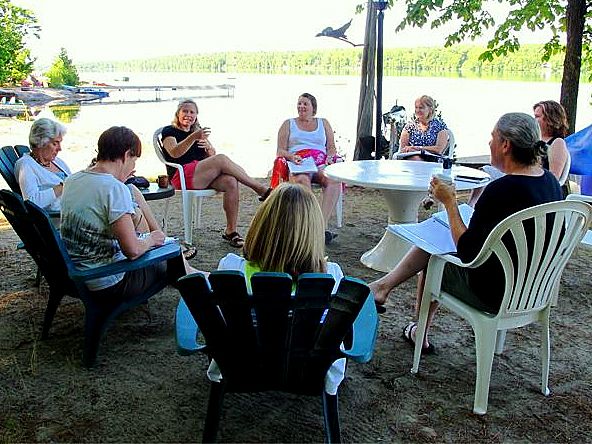
“I’ve heard lots of great advice, but one thing that sticks with me is: Write because you love writing, not because you love publishing. Eliza Clarke said that to me when I just started publishing work and was much more keen on being published than I was on sitting down, all lonely and hermit-like and actually writing. The writing part seemed to me the boring job. Now, years later, I love the writing and dread the publishing, strangely enough. When the book goes out there, into the big wide world, you have no control over it. It becomes something else, not your baby.”
~ Michelle Berry, “Michelle Berry Answers rob mclennan’s Questions”
I couldn’t have been more pleased that Michelle Berry agreed to speak to participants at my Turquoise Waters Writer’s Retreat in Kawartha Lakes. Michelle, a fellow instructor in the Creative Writing Program at University of Toronto’s School of Continuing Studies, has published acclaimed novels and short story collections (see bio below). During her talk she was charming and candid, setting everyone at ease and allowing writers’ questions to guide a conversation that touched on her own fiction writing, development of craft, and the current state of publishing.
Here are some tips that we gleaned from Michelle’s presentation.
1. Study great literature. Read a lot and read widely. How can you write well without an overview of what’s gone before, without analyzing others who excel at their craft? When for any reason Michelle can’t write, you’ll find her reading.
2. Sharpen your powers of observation. Good writers are good observers. Keep a notebook to record what you see and hear and in every way sense around you — at least until such observation becomes second nature.
3. Look below the surface of things. People and events are not always as they seem. The best stories explore glimpses of this tension between the seen and the unseen. Many of Michelle’s stories have these roots.
4. Write first, outline later. For literary fiction and memoir, write to see where your ideas take you. Then outline at the end of your first full draft to help shape the story. For nonfiction and genre fiction, do the opposite.
5. Don’t let research stifle your creative flow. You’re a creative writer, so when writing passages about things you don’t know, first use your imagination. (Michelle’s example: how to embalm a body!) Research and correct the facts later. There are pitfalls to researching as you write. You may learn too much and feel compelled to include unnecessary facts that slow the story’s pace. And you may use research as an excuse to procrastinate.
6. Recognize your writing strengths. For Michelle, dialogue comes more naturally than description, present tense more naturally than past tense. (She admits the latter is unusual.) Writers should always strive to deepen their craft, but sometimes voice is best served by paying attention to the style that flows most easily.
7. Hire a mentor, coach, or editor. A good mentor can help you to avoid wasting time writing in the wrong direction. Be prepared to consider the issues and possible solutions your mentor raises, even as you make the revisions your own. That way you’ll make the most of her time and yours.
8. Think about submitting your work to smaller Canadian presses. They publish fewer titles per year and can often give authors’ books more attention than the major publishing houses. The publishing field is in a state of flux. Explore alternatives.
9. View a rejection letter not as a sign of defeat but as a challenge. Let it fuel your determination to keep writing, to hone your skills — to prove wrong those who rejected you.
10. Get involved in the writing community. Volunteer with national, provincial, or local organizations. You’ll find an exciting and supportive network of like-minded writers out there and make valuable contacts along the way.
11. Keep at your writing, even when the going gets tough. Keep at it for those precious moments when you love what you’ve written, when you just KNOW you’ve written the perfect sentence or paragraph, when you’ve captured a scene or an emotion just right. Celebrate those moments. They’re what being a writer is all about.
* * *
 Michelle Berry is the author of three books of short stories, How to Get There from Here, Margaret Lives in the Basement, and I Still Don’t Even Know You (which won the 2011 Mary Scorer Award for Best Book Published by a Manitoba Publisher and was shortlisted for the ReLit Award, 2011), as well as four novels, What We All Want, Blur, Blind Crescent, and This Book Will Not Save Your Life (which won the 2010 Colophon Award and was longlisted for the ReLit Award, 2011). Her writing has been optioned for film and published in the U.K. She is also co-editor with Natalee Caple of The Notebooks: Interviews and New Fiction from Contemporary Writers, and has collaborated on an art book with Winnipeg artist Andrew Valko called Postcard Fictions. Michelle taught creative writing at Ryerson University, Humber College, and Trent University, was on the board of PEN Canada and the authors’ committee of The Writers’ Trust of Canada, and served as second vice-chair of The Writers’ Union of Canada. She teaches online for University of Toronto, and is a mentor at Humber College. She is also a reviewer for The Globe and Mail.
Michelle Berry is the author of three books of short stories, How to Get There from Here, Margaret Lives in the Basement, and I Still Don’t Even Know You (which won the 2011 Mary Scorer Award for Best Book Published by a Manitoba Publisher and was shortlisted for the ReLit Award, 2011), as well as four novels, What We All Want, Blur, Blind Crescent, and This Book Will Not Save Your Life (which won the 2010 Colophon Award and was longlisted for the ReLit Award, 2011). Her writing has been optioned for film and published in the U.K. She is also co-editor with Natalee Caple of The Notebooks: Interviews and New Fiction from Contemporary Writers, and has collaborated on an art book with Winnipeg artist Andrew Valko called Postcard Fictions. Michelle taught creative writing at Ryerson University, Humber College, and Trent University, was on the board of PEN Canada and the authors’ committee of The Writers’ Trust of Canada, and served as second vice-chair of The Writers’ Union of Canada. She teaches online for University of Toronto, and is a mentor at Humber College. She is also a reviewer for The Globe and Mail.
* * *
I love these concise, practical tips – food for thought.
Thank you, Allison, for your nice comment. I’m all about being practical (even though I’m not always precise)! cheers, Michelle
Love these. I am not a big planner when I write, at least not on paper. It happens probably more inside my head.